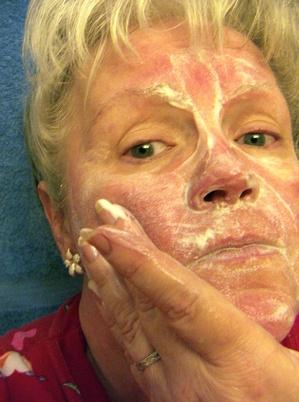Rosacea is a chronic skin condition that typically affects fair-skinned women between the ages of 30 and 60, according to the National Institutes of Health. The symptoms for the condition vary depending on which subtype of rosacea you have. These symptoms range from a faint flush on the face to acne to large red bumps.
Time Frame
The sooner you begin rosacea treatment, the better your chance of reducing the signs and symptoms of the condition, reports the American Academy of Dermatology. Without treatment, which can include topical skin care products, rosacea can continue to progress, with skin problems proceeding from mild to worse. Early treatment may even prevent rosacea from progressing.
Identification
The type of skin care products your doctor recommends may vary depending on the subtype of rosacea you have, reports the AAD. Erythematotelangiectatic type rosacea is the subtype of the condition that causes your face to turn red or flush. If you have papulopustular rosacea, you may develop bumps or pus-filled lesions. Phymatous rosacea causes a thickening of the skin. Ocular rosacea occurs when the condition affects your eyes.
Types
A proper skin care regimen can help reduce the visible signs of rosacea. Products like facial cleansers, sunscreen and moisturizers can help, reports the National Rosacea Society. Certain products irritated skin in 41 percent of people surveyed by the society. Skin care products that might cause irritation include witch hazel, alcohol, peppermint, fragrance, menthol and eucalyptus oil.
Misconceptions
Skin care products for rosacea can’t cure the condition, reports the Mayo Clinic. They can help reduce the signs and symptoms of rosacea to a point where they are not noticeable or visible, depending on your body’s response to treatment.
Expert Insight
In an article in ScienceDaily, Dr. Jenny Kim, an associate professor of dermatology at the University of California, Los Angeles, recommends combining a moisturizer with sunblock to help rosacea symptoms. She also says most rosacea patients can use over-the-counter products with benzoyl peroxide or salicylic acid to help control acne. In severe cases, a patient may need to include a topical ointment like a retinol-based product.
Photo Credit
- woman rosacea image by robert mobley from Fotolia.com





